CHF 10,000 Fuels 3D Orthoses, Precision Grain, AI Websecurity, AI Culture, Sport Injury, and Underground Pipes Laying
23.06.2025
Aligna3D, Grenat, Haicker, Melior, Optizone, and Swissloop Tunneling were selected at Venture Kick's first financial and entrepreneurial support stage. Their projects develop a customized 3D-printed orthosis to maintain optimal alignment, enhance comfort, and reduce surgeons' workload; empower small-scale farmers with precision grain sorting; employ sophisticated AI agents to automate comprehensive, dynamic, and static vulnerability assessments; make museums enjoyable for everyone through personalized AI-powered experiences; pinpoint risk sources for high-risk athletes and provide science-backed, personalized recommendations; and eliminate the need for prefabricated pipes and reduces surface disruption.
 |
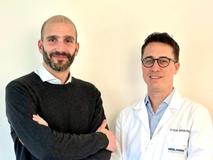 Aligna3D: Alexandre Saconney-Pfister & Dr. V. Dubois-Ferrière
|
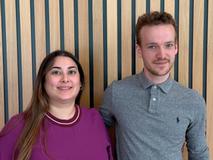 Grenat: Luisa Collomb & Josué Scheidegger
|
 Haicker: CEO Philippe Dourassov & CTO Manaf Mhamdi Alaoui
|
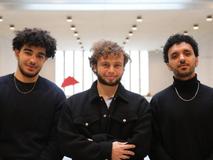 Melior: CTO Rasan Younis, CPO Eliot Ullmo, & CEO Menelik Nouvellon
|
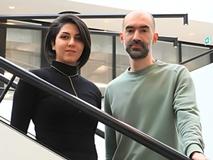 OptiZone: CEO Dr. Mina Baniasad & CTO Soroush Bagheri
|
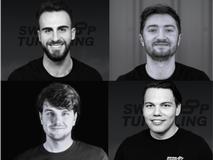 Swissloop Tunneling: CEO Eugenio Valli, CTO Philippe Kientsch, COO Dore De Morsier, & CFO Stefan Kaspar
|
Aligna3D: Patient-specific post-operative orthoses for hallux valgus
Hallux Valgus (HV) is a common foot deformity affecting 23% of adults. It is one of the most performed orthopedic procedures, with over 7,400 cases annually in Switzerland. Current post-operative methods, which rely on tapes and separators, are uncomfortable and insufficiently reliable in maintaining toe correction, resulting in a 24.8% recurrence rate.
Aligna3D develops a customized 3D-printed orthosis to maintain optimal alignment, enhance comfort, and reduce surgeons' workload. A. Saconney-Pfister, a biomechanical engineer specialized in 3D technology, and Dr. V. Dubois-Ferrière, a leading orthopedic foot and ankle surgeon at the renowned Assal Center, lead the project. The scalable market, with over 700K surgeries annually in the EU and US, offers significant growth potential.
The Venture Kick funds will help finalize and freeze the orthosis design.
Grenat: Empowering small-scale farmers with precision grain sorting
Small-scale farmers, who represent 86% of global farms, struggle to sort alternative grains like millet and pulses efficiently. Manual sorting is time-consuming and inefficient, while current optical sorters are costly and designed for industrial scale, making them inaccessible.
Grenat is a Swiss startup developing a compact, AI-powered optical sorter tailored to traditional and climate-resilient crops, which are key to the future of agriculture. The founding team combines expertise in automation, mechanics, media, finance, and design, and collaborates with industrial partners and producer networks. Leveraging proximity and trust with future customers, Grenat targets over 100 million smallholders globally, from Europe to Africa and India.
Venture Kick Stage 1 funds will be used to finalize a working MVP and strengthen the collaboration with our industrial partner Panaprod, laying the foundation for upcoming pilot tests this fall and future scaling.
Haicker: AI-Enhanced Web Application Security
Haicker addresses undetected web application vulnerabilities by enhancing the detection of critical security issues. Leveraging advanced AI-driven analysis, it uncovers vulnerabilities that traditional methods miss, enabling proactive cybersecurity and protection of sensitive user data.
Founded by cybersecurity experts Philippe Dourassov and Manaf Mhamdi Alaoui, Haicker employs sophisticated AI agents to automate comprehensive, dynamic, and static vulnerability assessments. The startup targets the rapidly growing global web application security market, currently valued at approximately CHF 6 billion. Increasing threats and stringent compliance regulations significantly drive this demand, highlighting the importance of innovative cybersecurity solutions.
Haicker will use the VK Stage 1 funds to enhance AI models for deeper vulnerability detection. Additionally, the funds will accelerate early customer onboarding, validating market fit and scalability across diverse sectors.
Melior: Making museums enjoyable for everyone through personalized AI-powered experiences
Museums often present the same information to all visitors, which can be boring, confusing, or too time-consuming. This one-size-fits-all approach leaves many visitors disengaged and cultural institutions struggling to connect with diverse audiences.
Melior transforms smartphones into intelligent museum guides that adapt to each visitor's interests and knowledge level. Founded by ETH Zurich graduates, the startup creates interactive voice conversations that preserve curatorial vision while making exhibits accessible to everyone. The museum market alone represents USD 1.2 billion in total addressable market across 57,208 institutions worldwide, with expansion potential to cultural institutions, historical sites, and art galleries.
The Venture Kick Stage 1 funds will enable Melior to test and iterate on their MVP with pilot partners and prepare their platform for scale. This investment allows the team to validate their museum-first approach and establish the technical foundation for broader market expansion.
Hallux Valgus (HV) is a common foot deformity affecting 23% of adults. It is one of the most performed orthopedic procedures, with over 7,400 cases annually in Switzerland. Current post-operative methods, which rely on tapes and separators, are uncomfortable and insufficiently reliable in maintaining toe correction, resulting in a 24.8% recurrence rate.
Aligna3D develops a customized 3D-printed orthosis to maintain optimal alignment, enhance comfort, and reduce surgeons' workload. A. Saconney-Pfister, a biomechanical engineer specialized in 3D technology, and Dr. V. Dubois-Ferrière, a leading orthopedic foot and ankle surgeon at the renowned Assal Center, lead the project. The scalable market, with over 700K surgeries annually in the EU and US, offers significant growth potential.
The Venture Kick funds will help finalize and freeze the orthosis design.
Grenat: Empowering small-scale farmers with precision grain sorting
Small-scale farmers, who represent 86% of global farms, struggle to sort alternative grains like millet and pulses efficiently. Manual sorting is time-consuming and inefficient, while current optical sorters are costly and designed for industrial scale, making them inaccessible.
Grenat is a Swiss startup developing a compact, AI-powered optical sorter tailored to traditional and climate-resilient crops, which are key to the future of agriculture. The founding team combines expertise in automation, mechanics, media, finance, and design, and collaborates with industrial partners and producer networks. Leveraging proximity and trust with future customers, Grenat targets over 100 million smallholders globally, from Europe to Africa and India.
Venture Kick Stage 1 funds will be used to finalize a working MVP and strengthen the collaboration with our industrial partner Panaprod, laying the foundation for upcoming pilot tests this fall and future scaling.
Haicker: AI-Enhanced Web Application Security
Haicker addresses undetected web application vulnerabilities by enhancing the detection of critical security issues. Leveraging advanced AI-driven analysis, it uncovers vulnerabilities that traditional methods miss, enabling proactive cybersecurity and protection of sensitive user data.
Founded by cybersecurity experts Philippe Dourassov and Manaf Mhamdi Alaoui, Haicker employs sophisticated AI agents to automate comprehensive, dynamic, and static vulnerability assessments. The startup targets the rapidly growing global web application security market, currently valued at approximately CHF 6 billion. Increasing threats and stringent compliance regulations significantly drive this demand, highlighting the importance of innovative cybersecurity solutions.
Haicker will use the VK Stage 1 funds to enhance AI models for deeper vulnerability detection. Additionally, the funds will accelerate early customer onboarding, validating market fit and scalability across diverse sectors.
Melior: Making museums enjoyable for everyone through personalized AI-powered experiences
Museums often present the same information to all visitors, which can be boring, confusing, or too time-consuming. This one-size-fits-all approach leaves many visitors disengaged and cultural institutions struggling to connect with diverse audiences.
Melior transforms smartphones into intelligent museum guides that adapt to each visitor's interests and knowledge level. Founded by ETH Zurich graduates, the startup creates interactive voice conversations that preserve curatorial vision while making exhibits accessible to everyone. The museum market alone represents USD 1.2 billion in total addressable market across 57,208 institutions worldwide, with expansion potential to cultural institutions, historical sites, and art galleries.
The Venture Kick Stage 1 funds will enable Melior to test and iterate on their MVP with pilot partners and prepare their platform for scale. This investment allows the team to validate their museum-first approach and establish the technical foundation for broader market expansion.
OptiZone: Spotting injury before it happens
ACL injuries cause 40% of time lost in professional sports, keeping players out for at least nine months. One-third of those who return suffer a second injury. This affects clubs (underachievement), insurers (player salaries, medical costs), and athletes (market value drop). Each player is unique, and generic prevention methods may not work for all and can even increase injury risk by imposing extra load and fatigue.
With their wearable solution, they estimate dynamic knee valgus loading, which is the prominent risk factor responsible for 84% of recorded ACL injuries. Additionally, they pinpoint risk sources for high-risk players and provide science-backed, personalized recommendations, saving precious time and energy between the games. Their solution is validated by the FIFA Medical Center of Excellence and predicted 78% of injuries. The SOM is estimated to be $250 M. Dr. Mina BANIASAD, CEO, started this project in 2011 by launching a clinical motion analysis lab and ended up at EPFL, developing the wearable version of the lab. Soroush BAGHERI, CTO, is a professional basketball player with 8 years of experience in start-ups to assess team performance using wearable technology.
The Venture Kick funds will contribute to setting up demonstration sessions with top European clubs and enhancing hardware appearance. OptiZone.ch
Swissloop Tunneling: An efficient and cost-effective way of laying underground pipes.
Swissloop Tunneling addresses the growing need for efficient, sustainable, and non-disruptive methods to install underground utility pipes. Conventional open-trench construction is costly, space-intensive, and often impractical in dense urban environments.
Founders and board members of Swissloop Tunneling include CEO Mr. Eugenio Valli, CTO Mr. Philippe Kientsch, CFO Mr. Stefan Kaspar, and COO Mr. Doré de Morsier. The startup is developing a novel Micro Tunnel Boring Robot (MTBR) capable of autonomously building and lining boreholes using in-situ pipe extrusion. This innovation eliminates the need for prefabricated pipes and reduces surface disruption. The solution targets the multibillion-dollar underground utilities market spanning water, gas, power, and telecom sectors.
With the CHF 10,000 from Venture Kick Stage 1, Swissloop Tunneling will conduct targeted customer interviews and validate key market assumptions to strengthen its business case ahead of pilot deployment.


